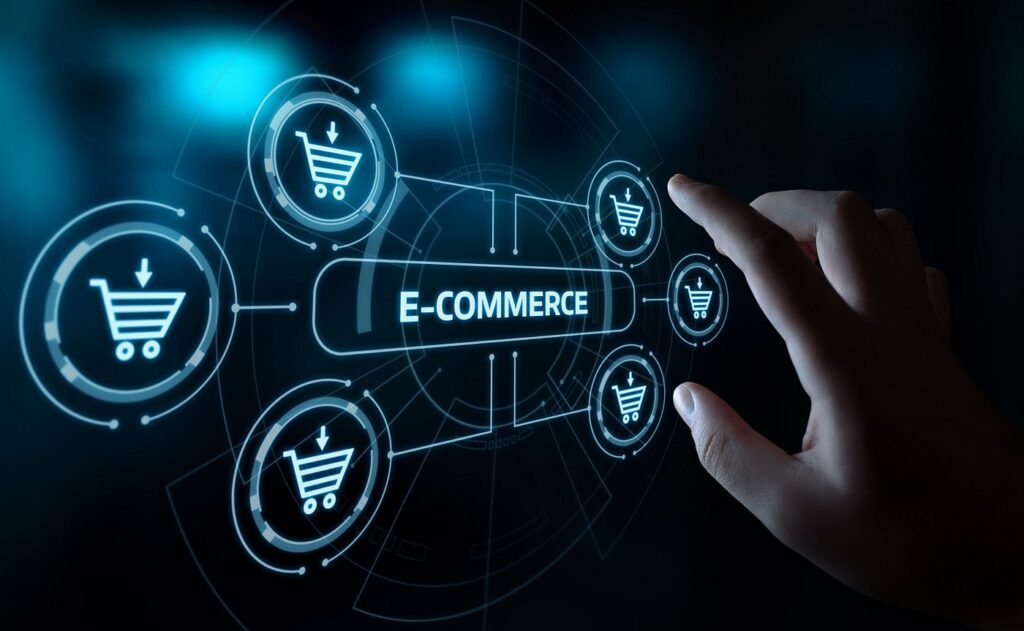Revolutionizing Commerce: Seizing the E-commerce Evolution for Unparalleled Success
E-commerce, the digital realm where goods and services traverse virtual aisles, has redefined the dynamics of trade. This exploration delves into the transformative journey of e-commerce, tracing its historical roots, exponential growth, and profound implications on commerce. Additionally, we scrutinize its merits, and demerits, and gaze into the crystal ball of future trends.

Understanding E-commerce
E-commerce, synonymous with online commerce, flourishes on platforms like Shopify, WooCommerce, and our bespoke 3Dots Commerce. It encapsulates the digital exchange of goods and services, offering a gamut of features including mobile shopping and secure online transactions. The virtual storefronts have become the nerve center for businesses, facilitating marketing, sales, and logistics operations.

Evolutionary Trajectory of E-commerce
Originating over four decades ago, e-commerce initially courted early adopters while traditional brick-and-mortar stores reigned supreme. However, the tide turned with a seismic surge in recent years, amplified by the COVID-19 pandemic’s impetus towards online shopping.
Statistics paint a compelling narrative:
- Global e-commerce sales soared past $5.8 trillion in 2023, projected to surge by nearly 39% in subsequent years (Stephanie Chevalier, Statista).
- Despite growth deceleration, 2024 is poised to witness a staggering $8.1 trillion in overall spending (Artios).
- By 2024, an estimated 20-24 million online commerce entities are expected to be operational, predominantly B2C (Business to Consumer) platforms.
Shifting Consumer Expectations and E-commerce’s Response
Consumer expectations have metamorphosed, demanding an immersive and tailored e-commerce experience. The conventional thrill of doorstep deliveries has evolved into a quest for personalized recommendations and augmented reality simulations. Customers seek seamless transactions and frictionless browsing, prompting businesses to pivot toward:
- Minimizing transactional hurdles.
- Crafting immersive brand engagements.
- Establishing omnipresent sales channels.\

Evaluating E-commerce’s Growth Catalysts
The burgeoning e-commerce landscape owes its ascent to several catalysts. Primarily, the pandemic-induced surge in online shopping catapulted e-commerce into the mainstream, fostering comfort and familiarity among consumers. Additionally, the omnipresence of wireless handheld devices has empowered businesses to tap into a vast digital marketplace seamlessly.
Pros and Cons of E-commerce
E-commerce embodies a double-edged sword, offering unparalleled benefits alongside inherent challenges. Businesses relish the expansive customer reach, operational efficiencies, and convenience it affords. Conversely, concerns loom over cybersecurity, diminished interpersonal connections, and fostering consumer trust. Addressing these concerns is imperative for cultivating a secure and seamless e-commerce ecosystem.

Glimpsing into E-commerce’s Future
The future horizon of e-commerce brims with transformative potential, fueled by cutting-edge technologies and evolving consumer preferences. Artificial intelligence, personalized experiences, and sustainability initiatives are slated to redefine the e-commerce landscape. Enterprises adept at embracing these trends and tailoring their offerings to meet evolving consumer demands are poised to thrive in the global e-commerce arena.
In Conclusion
From its nascent stages to its current digital dominance, e-commerce has emerged as a formidable force reshaping global commerce. Navigating this paradigm shift demands agility, innovation, and a keen understanding of evolving consumer dynamics. As e-commerce continues its evolutionary journey, businesses must remain nimble, leveraging emerging trends to chart a course toward sustained growth and prosperity.




